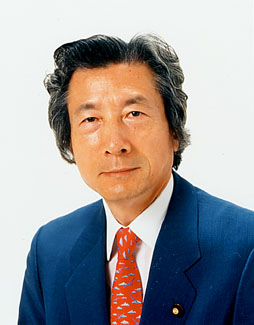
Both Koizumi's father and grandfather served in the Diet (parliament). He graduated with a degree in economics from Keio University, Tokyo, in 1967 and then attended the London School of Economics. Upon his father's death in 1969, he ran unsuccessfully for the seat, and in 1971 he ran again and was elected. In 1992–93 he was minister of posts and telecommunications and in 1988–89 and 1996–98 minister of health and welfare. He ran unsuccessfully for the presidency of the dominant Liberal-Democratic Party (LDP) in 1995 and 1998; upon the resignation of Mori Yoshiro in April 2001, Koizumi ran for the post once more and won, and he was soon confirmed as prime minister. It was the first election of an LDP head in which party rank and file at the prefectural level as well as Diet members could vote, and he won by a decisive margin.
With a reputation as an unconventional advocate of reform both within the party and in the government, Koizumi enjoyed widespread popular appeal. He appointed a cabinet that slighted traditional party factions and included a record five women, among them Tanaka Makiko (daughter of former prime minister Tanaka Kakuei) as foreign minister. His stated economic goals—which included privatizing the country's postal system, reducing government spending, and ending the practice of supporting failing businesses—met opposition in the Diet. He was conservative diplomatically, strongly supporting the United States following the September 11 attacks in 2001 and making annual visits to Yasukuni Shrine (where Japan's war dead, notably those of World War II, are enshrined) that evoked protests by China and the two Koreas. Even though his policies were thought likely in the short term to deepen the country's recession, the public remained supportive. In January 2002, however, his popular image as a reformer suffered when he dismissed from the cabinet the outspoken Tanaka, who had been openly critical of him. Nevertheless, his personal popularity remained high, and, in the national election of November 2003, he led the LDP to victory in parliamentary elections and was confirmed for another term as prime minister.
As Koizumi moved forward on his plans to privatize the country's postal system (which included a savings bank and insurance business), he faced growing resistance due to fears of job losses and reduction in services. In 2005 the House of Councillors (upper house) defeated his postal-privatization plan, prompting Koizumi to call for new elections in the House of Representatives (lower house). He also purged the LDP of those opposed to his plan. Held in September, the election marked a decisive victory for the LDP, which won a majority of the seats. Due to LDP term limits, Koizumi left office in September 2006 and was succeeded by Abe Shinzo.

No comments:
Post a Comment